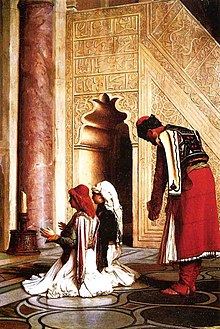Greek Muslims

As Greek Muslims or Greek-speaking Muslims ( Greek Ελληνόφωνοι μουσουλμάνοι Ellinófonoi mousoulmánoi ) refers to a those Greeks whose Christian ancestors during the time of the Ottoman Empire for and in modern times Islam had converted; As a result of emigration since the late 19th century, these Greek Muslims now mainly live in Turkey , Syria (in the hamlet of Hamidiya ), Libya and Lebanon. On the other hand, the Greek state considers all ethnic groups to be of Greek origin, regardless of scientific knowledge regarding their ethnic origin, and thus also the Turkish-speaking minority in Western Thrace as Muslim Greeks.
Various reasons are given for the conversion of Greeks to Islam, above all the poll tax ( jizya ): Muslims were exempt from certain taxes in the Ottoman Empire, and members of other religions were fiscally discriminated. Although the Ottomans basically granted religious freedom throughout the empire and never legally compelled Christians to convert, there were numerous conversions to Islam in south-eastern Europe . They were often caused by economic and socio-political endeavors. Christians also saw in the conversion the access to new job opportunities such as service in the Ottoman bureaucracy or the military ( see in some cases also: Janissaries ; these were forcibly Islamized during their training). A specific religious reorientation of the Christian population, controlled by means of economic policy, cannot be proven by the Ottoman archives. The Greek-speaking Muslims of Macedonia were sometimes called Vallahaden .
As early as the late 19th century, as a result of the armed conflicts between the Ottoman Empire and the now independent Greece, mainly Muslims from Crete were settled in Libya, Syria and Lebanon. As recently as 1988, Muslim Greeks in Lebanon and Syria reported that they were discriminated against by the Greek embassies for not being Orthodox Christians: they were viewed with indifference and even hostility, and they were given visas and opportunities to improve their knowledge of Greek through travel denied to Greece.
When the population exchange between Greece and Turkey took place within the framework of the Treaty of Lausanne , all sides only assigned the terms Turkish and Greek to the respective religion, so that in addition to ethnic Turks, numerous ethnic Greeks of Islamic faith also leave their homeland and settle in Turkey had to - just as, conversely, in numerically greater numbers, ethnic Greeks and Turks of Christian faith had to leave the newly formed Turkish state.
There are also Muslims in Turkey whose ancestors were Greeks from Asia Minor (e.g. Pontic Greeks who changed their religion) and were therefore excluded from the population exchange. One of them was Adnan Kahveci (1949-1993) from the Pontic Sürmene , advisor to Prime Minister Turgut Özal in the 1980s; Kahveci was fluent in Pontic .
literature
- Stephen Barbour & Cathie Carmichael (Eds.): Language and Nationalism in Europe . Oxford University Press , 2000, ISBN 0-19-823671-9 .
- Berna Pekesen: expulsion and emigration of Muslims from the Balkans. European History Online , ed. from the Institute for European History (Mainz) , February 2011. Retrieved on July 13, 2011.
Web links
- David Macintosh: Muslims in Greece seek refuge in a common Turkish identity in: islamische-zeitung.de from May 11, 2009
- Roula Tsokalidou: Greek-Speaking Enclaves of Lebanon and Syria . II Simposio Internacional Bilingüismo , accessed December 4, 2006 .
Individual evidence
- ↑ Cyril Glassé (ed.): The New Encyclopedia of Islam , Rowman & Littlefield , 2008, p. 129